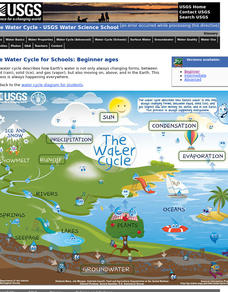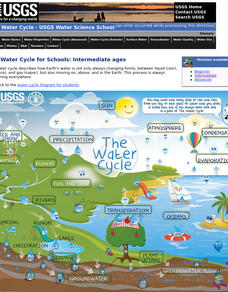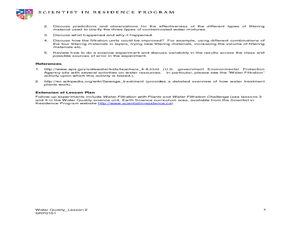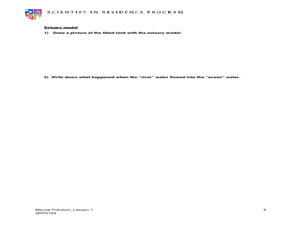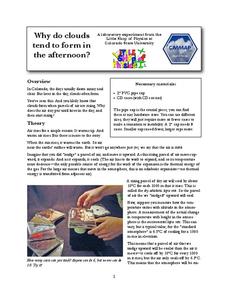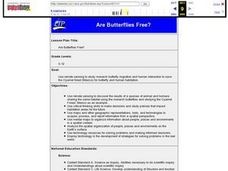Texas State Energy Conservation Office
Investigation: Waves and Whistles
Wave goodbye to the same old demonstrations for alternative energy sources, and wave hello to this one investigating ocean waves! Using a water bottle to create an oscillating water column, learners see and possibly hear how the...
American Museum of Natural History
Rising CO2! What Can We Do?
It is colorless and scentless, but it makes a large impact on the environment. Learners explore carbon dioxide emissions and what they mean for the environment using an interactive graph. They review changes over time and how they impact...
US Geological Survey
The Water Cycle for Schools: Beginner Ages
Explore a day in the life of a water droplet. An interactive infographic helps scholars learn how water cycles work from precipitation all the way around to condensation. Learners hover over each step of the cycle to read more as they...
Chicago Botanic Garden
Calculating Your Carbon Footprint
Unplugging from technology for one day per week will decrease your carbon footprint—are you up to the challenge? Part two in a series of three allows individuals to explore their personal carbon footprints. By first taking a quiz at home...
American Museum of Natural History
What do you Know About Climate Change?
Test the class's knowledge of the key components of climate change. A 10-question online quiz asks learners about weather, climate, greenhouse gases, and several other concepts related to climate change. Interactive and easy for...
Curated OER
Volcanoes!: The Mountain Blows its Top
Students observe two demonstrations to conclude why bulge developed on the north flank of Mount St. Helens and conclude that when the "cap" was removed the pressure inside the volcano was suddenly released causing the violent eruption.
Curated OER
Can Worms See?
Second graders discuss the previously created worm compost and the importance of living creatures to the Environment. In this worm lesson, 2nd graders observe worms and record their sensitivity to light. Students design a petri dish...
US Geological Survey
The Water Cycle for Schools: Intermediate Ages
Water can travel from the highest mountain tops to the largest oceans. Using an interactive, young scientists trace the movement using an interactive online resource. They follow the water cycle by reading pop-up explanations on a...
Curated OER
Water Quality: Water Filtration
Students build a water filtration system. In this water quality lesson, students work in groups to construct water filtration units that can purify contaminated water. This lesson is part of a larger unit on water quality.
Curated OER
Modeling Estuaries
Students create a model estuary. In this modeling estuaries lesson, students identify characteristics and mix water of varying densities. Students form a hypothesis, conduct an experiment, and analyze the results.
Curated OER
Kosovo: A Thousand Year Old Border Conflict
Students present proposals and negotiate with other representatives to bring lasting peace to the area through a simulated "Summit Conference."
Curated OER
The Properties of Water: "Dead Or Alive"
Students study the water cycle and create a booklet entitled: "Discover the Wonder of Water" They observe and record data regarding evaporation, condensation, and precipitation and how water moves from a solid to a liquid to a gas. They...
Curated OER
Everything is Made of Something
Young scientists can use this learning exercise to learn about natural resources, as well as what we use them for. A word search prompts pupils to find sixteen words about natural resources.
Curated OER
Water Speed and Erosion
Fourth graders investigate the process of water erosion. They observe the roots of a plant and discuss the concept of erosion. Next, in small groups they conduct an experiment to observe how water erodes soil on a stream table, and...
Curated OER
Storms and Extreme Weather
Students explore hurricanes and tornadoes by conducting an experiment. For this weather pattern lesson, students define many extreme weather vocabulary terms and discuss the relationship with static electricity. Students utilize plastic...
Channel Islands Film
Arlington Springs Man: Lesson Plan 2
West of the West's documentary Arlington Springs Man and a two-page scientific article about the same topic provide the text for a reading comprehension exercise that asks individuals to craft a one page summary of information gathered...
Curated OER
How To Make an Apple Pie and See the World
Learners have a class discussion on how the variety of foods we use on a daily basis come from all over the world. They identify foods that they are familiar with that come from other places.
Chicago Botanic Garden
Impacts of Climate Change
Scholars become experts on the eight major impacts of climate change through a jigsaw and grand conversation. They then research and present what they learned about effects specific to their region.
Chicago Botanic Garden
Climate Change Impacts on Ecosystem Services
The fourth activity in a series of five has classes participate in a jigsaw to learn about global impacts of climate change and then share their new information with a home group. Groups then research impacts of climate change (droughts,...
Colorado State University
Why Do Clouds Form in the Afternoon?
The stability of the atmosphere changes on a daily basis. A kinesthetic lesson models how the stability of the air changes as it's warmed by the sun. Learners connect their models to the changing air currents and movement of warm and...
Curated OER
Rubber Duckies and Ocean Currents
Students explore marine life by conducting a rubber duck experiment. In this water currents lesson plan, students practice identifying latitude and longitude coordinates on a map and define the currents of major oceans. Students discuss...
Curated OER
Oil Spill Cleanup
Learners participate in an oil spill simulation and how to clean it up. In this oil spill lesson plan, students also calculate the cost of the clean up of an oil spill.
Curated OER
Glacier Dynamics
Students create flubber glaciers. In this glacier dynamics lesson, students experiment factors that may affect glacier speed. Factors include slope, ice temperature, and basal conditions. Students develop hypothesis, conduct experiment,...
Curated OER
Are Butterflies Free?
Students use remote sensing to study monarch butterfly migration and human interaction to save the Oyamel forest (Mexico) for butterfly and human habitation.
Other popular searches
- Exploring Earth's Surface
- Earth's Surface Formations
- Changes to Earth's Surface
- Changes to Earths Surface
- Changes in Earth's Surface
- Changing Earths Surface
- Changing of Earth's Surface
- Changes in Earths Surface
- Mapping Earths Surface
- What Changes Earth's Surface
- Exploring Earths Surface
- What Changes Earths Surface




